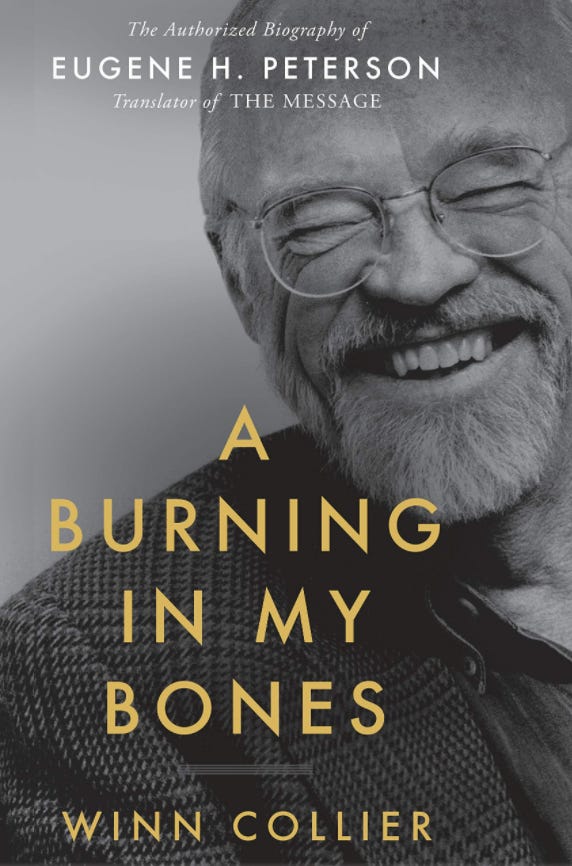Many pastors want to write. Many have something to say. From experience I can say most don’t understand the complexity of the writing process, and the time it requires. Good writers cannot not be writing, so the sudden attempt to write something meets more obstacles than one expected.
Photo by Art Lasovsky on Unsplash
Writing, more than anything else, requires lots of time and generous amounts of tranquility.
Time and tranquility.
Eugene Peterson’s story, as told by Winn Collier, A Burning in My Bones (pp. 196-239; for the reading plan), seems to have been a search for both time and tranquility for more than a decade.
The writer searches for a schedule that is open.
Tranquility started for Peterson with Jan. She was his “icon spouse.” Marriage was “heaven’s envoy.” (There is an involved, complicated relationship with another woman that Collier sorts out for us, one Eugene didn’t handle as well as he should have and it tested his marriage.)
In a journal entry Peterson refers to his calling as “writing/pastoring.” The order matters and it’s not a knock-down expression but it’s revealing nonetheless. That was the order he was becoming. Writing and pastoring, a dual calling, both needed, both in balance. He says
I must write. Writing is my vocation now…. If I cannot pray and run and read and write I cannot live.
He wanted to write “an evangelical American spirituality.” (He did, a four volume series with Eerdmans.)
The pastorate began to diminish, marriage was deepening, he was given other offers but he “wanted space, freedom. He wanted to write and teach.” Pittsburgh Theological Seminary invited him to be a writer in residence, he resigned 7 April 1991, and moved into a life of writing. “Dear God, I want to be a writer to your glory” he prayed.
He began to translate, starting with Galatians. And Psalms. A NavPress editor, Jon Stine, after reading his translation of Galatians in a book suggested he do the NT. He wanted to translate it into “Koine American”! An agent, Rick Christian, started working with Peterson but no publisher was interested.
NavPress was the only one interested. The Message is one of the most popular translations of the Bible. It’s fresh; it’s scintillating; it’s interpretive; it’s emotional. It’s alive. His goal was to recreate the text for the modern person. For Joe the Mover. He finished the NT and then moved to Vancouver to teach at Regent.
One of my most and least favorite portions of this book is the section about his students – least because they’re all strangers, favorite because it evokes for me the singular and personal relationship I have had with my students. Such can’t be described well.
He was never at home as a professor.
The classroom has to be the most uncongenial, unpromising environment ever devised to shape minds and spirits, to cultivate wisdom, to nurture love and relationship.
Why? it eliminates imagination. Preaching in a big church is perhaps even more so.
When The Message arrived his world was turned upside down. He became a national figure. He hated the pedestal; he was a pastor, not a professor.
Collier speaks of Peterson’s struggle with bourbon.
He struggled too with evangelicalism and thought the pastors took themselves too seriously. Agreed.






Thanks, Scot, for continuing to host this discussion. I was out of town last week, so I didn't get the chance to weigh on last week's question. Per this week's topic, I think there's a big difference between being a writer and a published author. The former doesn't always lead to--nor does it require--the latter. I'm one of those pastors who has an itch or a burn to write. For me, it's a way of thinking. I suspect it's a gift that help compensates for my other weaknesses. To paraphrase something Eugene said in another context, "Whenever I get bested in personal conversation, I pick up my weapon of choice ... my pen ... and I write."
I have found ways to use writing in pastoral ministry. One of the most unconsciously competent things I've ever done was to write a weekly letter to our church family. I'm certainly not the only pastor to do something like this. But I'm always surprised at the traction it gets. Some people tell me that it has discipled them; others admit they only read the last paragraph where I share a humorous story about something my grandkids have done or said.
Writing for publication is a different animal. There is a level of sacrifice for both pastors who feel the urge to do so. I've been diligent about writing on my "own time"--evenings, early mornings, my day off, or sabbatical. Even though I could argue that writing is an extension of my ministry, I'm careful not to let it encroach on my pastoral role. I've done so with the blessing of my wife, and I do it when it doesn't interfere with our time together. It's a lot easier than when our kids were younger.
I have a lot more I could say about writing and pastoral ministry, but I have a weekly letter to write to our church family!
My two favorite lines in this section were from his journals. "My anchor to my soul and my God is in this pen." "I feel that to keep my sanity - my spiritual sanity - I must simply walk away from the demands and duties and create."